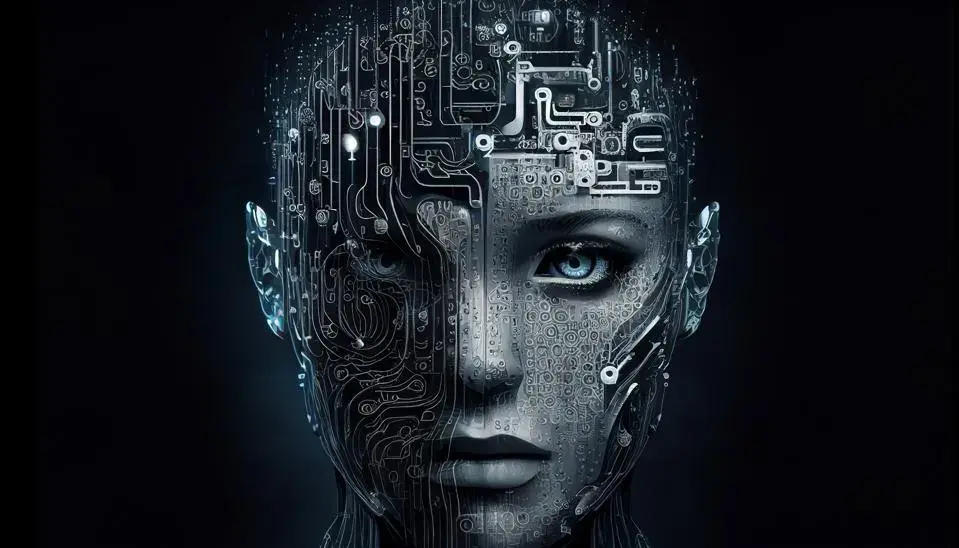Index
Introduction
AI 2041: Ten Ways in Which AI change our World
In today's time, if we talk about artificial intelligence, then its trend is in the transitional period. Where modernity of the internet, increase in the quality of facilities and non-humanized technology and transport, etc. are taking place. AI stands for Artificial Intelligence and refers to the ability of machines to mimic human intelligence such as learning, reasoning, perception, and decision-making. But it contains both positive and negative aspects in itself.
AI involves the development of algorithms and models that enable machines to perform tasks that typically require human intelligence, such as recognizing speech, understanding natural language, playing games, driving a car, and predicting outcomes. AI has a wide range of applications in various fields including health care, finance, transportation, and entertainment.
Following are 10 ways through which artificial intelligence can influence and change our lives.
Healthcare:
AI is being used to develop new drugs, diagnose diseases, and personalize treatments for patients. AI will revolutionize health care by improving diagnosis, enabling personalized treatment plans, and accelerating drug discovery. AI-powered medical tools and algorithms will help monitor patients remotely, leading to more efficient healthcare delivery and better patient outcomes.
- Drug discovery and development: AI can accelerate the drug discovery and development process by analyzing massive datasets and identifying potential drug candidates. Machine learning algorithms can help identify new drug targets, optimize molecular structures, and predict drug efficacy and toxicity.
- Disease prediction and prevention: AI algorithms can analyze massive amounts of health data, including demographic information, environmental factors, and genetic profiles, to identify disease risk factors and predict disease outbreaks.
Education:
AI-powered systems are revolutionizing education by providing personalized learning experiences, grading papers, and automating administrative tasks. The integration of AI (Artificial Intelligence) in education has the potential to significantly transform and improve the learning process. By the year 2041, AI is expected to have the following impact on education: It will decide the academic future of future generations. While it is difficult to predict the exact impact of AI on education over the next 20 years, AI will likely continue to play an increasingly important role. AI has the potential to personalize education, allowing students to learn at their own pace and in their style.
In the education field, these are some effects that will be crucial for the next generation.
- Personalized Learning: AI will enable personalized learning experiences tailored to individual students' needs and abilities. Intelligent tutoring systems will provide adaptive and customized learning paths, ensuring that students receive content and support that aligns with their specific learning styles and pace.
- Collaborative learning and global connections: AI-enabled platforms will facilitate collaborative learning experiences among students from different locations and backgrounds. Language translation capabilities and cross-cultural understanding tools will foster global connections and foster a diverse and inclusive learning environment. Due to this, it will bring important changes and new revolutions in the field of education.
- Virtual and Augmented Reality: AI-powered virtual and augmented reality technologies will create immersive learning experiences. Students will be able to explore historical events, travel to distant locations, or conduct virtual experiments, increasing their understanding and engagement with the subject matter. Who will be able to experience cultural diversity and changes on a personal level?
Transportation:
Self-driving cars and trucks are being developed using AI technology, which has the potential to reduce accidents and congestion on our roads. AI is expected to have a significant impact on transportation in various aspects, which will determine the condition and direction of transportation. Here are some key areas where AI has the potential to make a difference.
- Autonomous Vehicles: AI is at the forefront of enabling autonomous vehicles (AVs). AI algorithms help with perception, decision-making, and control systems, allowing vehicles to navigate and react to their surroundings without human intervention. AV has the potential to increase road safety, reduce traffic congestion and improve fuel efficiency. Which will solve the social and traffic-related problems of this society.
- Energy efficiency: AI can contribute to energy efficiency in transportation by optimizing routes, improving traffic flow, and suggesting eco-friendly driving practices. It can analyze vehicle and infrastructure data to help identify areas for improvement and reduce carbon emissions. Due to this, the dependence on the earth's resources will be reduced.
Customer service:
AI-powered chatbots are becoming increasingly popular in customer service, providing instant responses and reducing wait times. Along with this, it will also promote unemployment, violence, and inequality. Predicting specific advances in AI and customer service in the year 2041 is challenging because it is so far into the future. However, based on the trajectory of AI development and its potential impact on customer service, we can imagine some of the potential changes that we could potentially see in ours.
- Emotional intelligence and empathy: AI agents will be equipped with emotional intelligence algorithms that can understand and respond to customer emotions effectively. They will be able to detect frustration, satisfaction, or confusion in the customer's voice or text and adjust their responses accordingly, providing an empathetic and helpful conversation.
- Advanced Decision Support: AI will assist human customer service representatives in making complex decisions by analyzing large amounts of data and providing actionable insights. This collaboration between AI and human agents will lead to more informed and efficient customer service interactions.
Personalized learning:
AI-powered educational platforms will provide personalized learning experiences tailored to the needs and abilities of individual students. Intelligent tutoring systems, adaptive assessment, and virtual reality tools will enhance educational outcomes and make learning more engaging and accessible. However, its use will depend on the utility and goal of man.
- Access and Inclusion: AI can help address accessibility challenges by providing personalized accommodations for learners with diverse needs. It can customize content delivery, provide alternative formats (such as text-to-speech or translation), and provide assistive technology to support learners with disabilities or different learning styles.
- Customized content: AI can generate or recommend personalized learning content based on the specific needs of the learner. It can analyze learner progress, interests, and learning styles to create content that is most relevant and engaging to them.
Climate Change Mitigation:
AI will contribute to addressing climate change by optimizing energy consumption, predicting and managing natural disasters, and assisting in environmental monitoring and conservation efforts. AI algorithms will enable more accurate climate modeling and guide sustainable practices.
Ethical AI Governance:
As AI becomes more integrated into society, the need for ethical AI governance will grow. There will be an increased focus on addressing biases, ensuring transparency, and establishing guidelines to govern the responsible development and deployment of AI technologies.
- Advanced ethical frameworks: By 2041, there are likely to be more advanced and comprehensive ethical frameworks governing AI systems. These frameworks will include principles and guidelines that address issues such as fairness, transparency, accountability, confidentiality, and bias.
- Responsible AI leadership: Ethical AI governance will require responsible leadership from AI developers, organizations, and policymakers. Emphasis will be placed on fostering a culture of ethical responsibility and accountability within the AI community.
New economic opportunities:
AI will create new economic opportunities and job roles, and spur innovation and entrepreneurship. Industries such as robotics, data analytics, and AI development will see significant growth, leading to the emergence of new careers and industries. Apart from this, it will also take industries and technical competition to new heights. We should use it keeping in mind the future of future generations.
- Automation of routine tasks: AI will continue to automate routine and repetitive tasks across various industries. This automation will free up human resources, allowing them to focus on high-value tasks that require creativity, problem-solving, and critical thinking.
- AI-powered industries: Industries will increasingly integrate AI technologies into their operations, resulting in new economic opportunities. Sectors such as healthcare, finance, manufacturing, transportation, agriculture, and retail are likely to see significant changes.
Energy:

AI is being used to optimize energy consumption, reduce waste, and improve sustainability. Predicting the specific impact of AI on the energy sector in 2041 is highly speculative as it is that far into the future. However, based on current trends and potential advances in AI, we can imagine some general effects:
A. Energy management and efficiency: AI can optimize energy management in buildings, industries, and homes. AI-enabled systems can analyze energy consumption patterns, identify inefficiencies, and recommend energy-saving measures. However, its management should be very careful.
B. Energy management and efficiency: AI can optimize energy management in buildings, industries, and homes. AI-enabled systems can analyze energy consumption patterns, identify inefficiencies, and recommend energy-saving measures. However, its management should be very careful.
Security:
AI-powered systems are being used to improve public safety, identify potential threats, and prevent cyber attacks. AI is expected to have a significant impact on the security sector, transforming various aspects of security operations and enhancing overall security and threat detection capabilities.
- Cyber security and fraud detection: AI can strengthen cyber security protections by identifying and mitigating cyber threats. AI algorithms can analyze network traffic, detect anomalies, and identify patterns associated with malicious activity.
- Video surveillance and monitoring: AI can enhance video surveillance systems by enabling real-time analysis of video feeds. AI algorithms can detect and track objects, recognize faces, recognize license plates, and analyze behavioral patterns.
Conclusion:

In conclusion, AI is expected to have a profound impact on human life in various fields in 2041. Although specific impacts are hypothetical, we can anticipate significant progress and changes based on current trends and potential developments. In healthcare, AI could revolutionize diagnosis, personalized medicine, and drug discovery, leading to improved patient outcomes and more efficient healthcare delivery. The energy sector can benefit from the optimization capabilities of AI, smart grid management, renewable energy integration, and increased energy efficiency. In the security sector, AI can enhance threat detection, video surveillance, cyber security, and decision support, enhance security and improve response capabilities. The impact of AI on transportation could lead to autonomous vehicles, optimized logistics, and advanced traffic management, which could change the way we travel and commute.
Education can see personalized learning experiences and AI-powered educational tools, which promote individual skill development and knowledge acquisition. AI can also impact customer service by enabling personalized and efficient interactions with businesses.
Ethical AI governance will play a key role in ensuring responsible AI development and deployment, addressing issues of fairness, transparency, accountability and bias. While AI presents immense opportunities, there are also concerns such as ethical considerations, privacy, job displacement, and the need for regulations.
